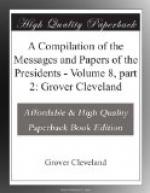The experiment of sending a number of Indian children of both sexes to the Hampton Normal and Agricultural Institute, in Virginia, to receive an elementary English education and practical instruction in farming and other useful industries, has led to results so promising that it was thought expedient to turn over the cavalry barracks at Carlisle, in Pennsylvania, to the Interior Department for the establishment of an Indian school on a larger scale. This school has now 158 pupils, selected from various tribes, and is in full operation. Arrangements are also made for the education of a number of Indian boys and girls belonging to tribes on the Pacific Slope in a similar manner, at Forest Grove, in Oregon. These institutions will commend themselves to the liberality of Congress and to the philanthropic munificence of the American people.
Last spring information was received of the organization of an extensive movement in the Western States, the object of which was the occupation by unauthorized persons of certain lands in the Indian Territory ceded by the Cherokees to the Government for the purpose of settlement by other Indian tribes.
On the 26th of April I issued a proclamation[40] warning all persons against participation in such an attempt, and by the cooperation of a military force the invasion was promptly checked. It is my purpose to protect the rights of the Indian inhabitants of that Territory to the full extent of the executive power; but it would be unwise to ignore the fact that a territory so large and so fertile, with a population so sparse and with so great a wealth of unused resources, will be found more exposed to the repetition of such attempts as happened this year when the surrounding States are more densely settled and the westward movement of our population looks still more eagerly for fresh lands to occupy. Under such circumstances the difficulty of maintaining the Indian Territory in its present state will greatly increase, and the Indian tribes inhabiting it would do well to prepare for such a contingency. I therefore fully approve of the advice given to them by the Secretary of the Interior on a recent occasion, to divide among themselves in severalty as large a quantity of their lands as they can cultivate; to acquire individual title in fee instead of their present tribal ownership in common, and to consider in what manner the balance of their lands may be disposed of by the Government for their benefit. By adopting such a policy they would more certainly secure for themselves the value of their possessions, and at the same time promote their progress in civilization and prosperity, than by endeavoring to perpetuate the present state of things in the Territory.
The question whether a change in the control of the Indian service should be made was in the Forty-fifth Congress referred to a joint committee of both Houses for inquiry and report. In my last annual message I expressed the hope that the decision of that question, then in prospect, would “arrest further agitation of this subject, such agitation being apt to produce a disturbing effect upon the service as well as on the Indians themselves.” Since then, the committee having reported, the question has been decided in the negative by a vote in the House of Representatives.




